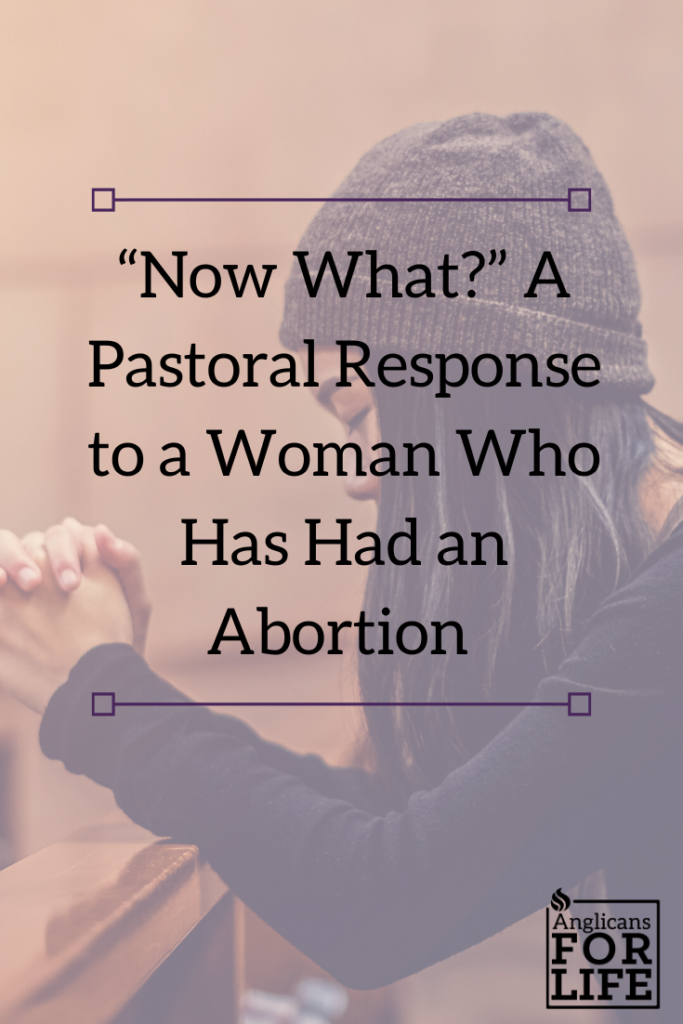Let us imagine a scenario. You are the Rector of an average-size church. You have consistently preached and taught about the Church’s position on life and abortion. You are working on some emails one day when you hear a knock at the door of your study. You open the door to find one of your parishioners. She wants to talk to you. She has been a faithful member as long as you have been the Rector, and you have never seen her this distraught. You invite her in and ask her what is on her mind. She pauses, takes a deep breath, and tells you, “Father, I have been carrying a terrible burden. Before I was a Christian, I had an abortion. You are the only person outside of my immediate family I have told. I feel guilty and ashamed about it.” How do you respond?

When any person comes to us in a vulnerable state, we need to take careful stock of the situation. It is always appropriate to weep with those who weep (Rom 12:15). Such compassion should be our first response. We should pause, not rushing to give an answer. We must also realize that there is not a one size fits all response. We must “admonish the idle, encourage the fainthearted, help the weak,” and “be patient with them all.” (1 Thess 5:14) To offer a response, we need to know the person. We need to know the Scriptures. And we need to know our role in that moment.
In this scenario, we may make a few assumptions. First, the woman is a Christian. Second, she has been in church for a while, so we may assume that she has more than a rudimentary knowledge of the faith. We may assume that she knows that Jesus bore all of our sins. Third, her knowledge of the Gospel is not assuaging her guilt. The response will proceed on these assumptions.
Your first job is to declare to her the forgiveness that she has in Christ. Since she is a Christian, you know that she is living a life of repentance. She would not have sought you out otherwise. You, as the pastor, possess the power of the keys: whose sins you forgive are forgiven, whose sins you retain are retained (Matt 18:18; John 20:23). You are not giving her new information nor are you declaring a new reality. We can assume that she understands, intellectually, that she is forgiven. But she has not told anyone her deepest guilt and shame. She needs to hear someone, outside of herself, declare to her the truth that “there is no condemnation for those in Christ Jesus.” (Rom 8:1) And she needs to hear it from Christ’s representative in the Church. That’s you.
Your second job is just as important: you need to teach her how to lament. She needs to process her grief. For her to process her grief, you must first invite her to go into some details about her abortion. She needs to know that she has been heard and allowing her this time will help. This may also be the first time that she has really come face to face not only with her actions but with the loss of her child. After letting her tell her story, you should point her to the Scriptures. The Scriptures address us in our grief. The Psalms contain many examples of lamentation, both for external circumstances and personal sin. The Book of Lamentations laments the fall of Jerusalem that resulted from Israel’s sin. By showing her that lament is in the Scriptures, you validate her grief. She may think that her grief is a sinful emotion, heaping the “guilt” of being sad on the guilt of having an abortion. It is not. By teaching her to pray the Psalms as her own prayers, you will give her honest words to process her darkest feelings. The difference between lament and despair is that lament is grieving in faith, while despair is grieving without faith.
Your third job is to point her to an abortion after care program. While we focus on abortion as a moral issue, we should not ignore the trauma that proceeds and follows an abortion. Aside from grieving the loss of the child, the woman will probably have other things that need to be addressed in a safe environment. Some of these things may inhibit her walk with the Lord if not addressed. You need to know of groups in your area where you can send her.
While the scenario at the beginning was fictional in its details, the contours of the story are a reality that many pastors will face. The woman described at the beginning could be in your church. More than likely, this woman is not the one you would expect. But this is the best news of all. Abortion is a great evil; it is not, however, the unpardonable sin. We must declare Christ’s forgiveness for all who turn to Him in repentance and faith. And we must use the means that He has given us, in the Scriptures, to encourage and strengthen all who desire to walk in newness of life.
Written by The Rev’d Deacon Matthew R. Miller, PhD. Matthew lives in Wichita, KS, with his wife and three young daughters. He holds a PhD from the Southern Baptist Theological Seminary and is a Transitional Deacon in the Jurisdiction of the Armed Forces and Chaplaincy.
For more guidance for priests and pastors seeking to counsel those grieving past abortions, check out AFL’s Clergy Counseling brochure.



